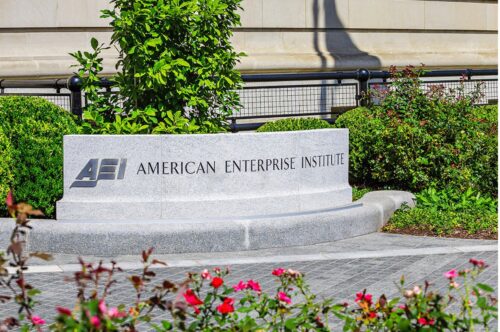A humble approach to giving in the face of a professional philanthropic discourse that continues to be dominated by grand rhetorical flourishes.
“We have to do more than offer Band-Aids and, ideally, work on more than symptoms. We aim to identify underlying causes, because attacking them is the only way that finite resources can make a difference.” So wrote Pew Charitable Trusts president Rebecca Rimel in 1999, echoing John D. Rockefeller’s exhortation from almost a century earlier that “the best philanthropy . . . involves a search for cause, an attempt to cure evils at their source.”
Over that century, Rimel and her foundation colleagues have increasingly concluded that the problem of finite resources is best addressed by directing them toward influencing public policy. Only by “leveraging” the much larger resources of government, it seems, can philanthropy hope to penetrate to the root causes of our problems.
Root-cause philanthropy desperately needs a lesson in humility from the late James Q. Wilson. Justly described in his obituaries as the foremost social scientist of his generation, Wilson was entirely comfortable with the notion of root causes and the power of the social sciences to help us understand them.
But he was increasingly persuaded over his long and distinguished career that understanding root causes was one thing. Actually being able to alter them using the limited range of policy tools available to a free and democratic government was quite another.
In one of his first influential articles -- “Crime and the Criminologists,” published in Commentary in the mid-70s -- Wilson embraced sociology’s conclusion that the root cause of crime could be traced to dysfunctional families and neighborhoods. But, he continued, “if a child is delinquent because his family made him so or his friends encouraged him to be so, it is hard to conceive what society might do about this.”
Social problems “are almost invariably caused by factors that cannot be changed easily or at all, because human behavior ultimately derives from human volition -- tastes, attitudes, values or whatever -- and these aspects of volition are in turn formed either entirely by choice or are the product of biological or social processes that cannot or will not change.”
It’s not that public policy can do nothing to fight crime. It can in fact add to the disincentives for criminal behavior, Wilson maintained, through faster apprehension and more certain punishment. But such measures can only marginally and superficially affect that behavior, because its root causes are deeply embedded in seemingly unreachable and unchangeable human nature.
Wilson thereby brought to our attention the “causal fallacy,” the mistaken “assumption that no problem is adequately addressed unless its causes are eliminated.” When Rimel suggests that attacking “underlying causes” is the only way to “make a difference,” she falls victim precisely to that fallacy. And when she and her colleagues redirect their “finite resources” toward affecting public policy, they in fact commit them to an approach that, Wilson insists, is less, rather than more, likely to reach “underlying causes.”
Later in his career, and as our social problems seemed to flow ever more directly and copiously from adamantine human nature, Wilson tried to push beyond the constricted bounds of conventional public policy, seeking ways to restore the bonds of family and community through faith-based institutions and other powerful moral and spiritual (and therefore extra-governmental) devices. At the precise moment philanthropy was devoting itself ever more to policy, Wilson might have pointed out, it could have been more effective by returning to its origins in faith.
But for philanthropy, especially a philanthropy of finite resources, Wilson’s work on crime left us another legacy as well. In “Broken Windows,” an immensely influential article co-authored with George Kelling for Atlantic magazine in 1982, Wilson in effect travels in the opposite direction from a deep-diving pursuit of crime’s root causes. Indeed, he suggests that, for everyday citizens, the actual rate of crime in the neighborhood, whatever its distant and intractable root causes, is less important than the immediate and concrete sense that its public places are predictable, orderly, and safe.
Citizens tend to fear obstreperous teenagers or rowdy drunks accosting them in broad daylight more than the depredations of the thief in the night, so to speak. Wilson goes on to note that this is not at all irrational, because neighborhood residents intuitively understand that the first signs of disorder and decay in their immediate surroundings, left untended, signal to others that “anything goes” here. “One unrepaired broken window is a signal that no one cares.” And where no one cares, more potent forces of disorder soon arrive, breaking more windows, loitering, disrupting, and driving decent folk from the streets, ultimately dragging the neighborhood toward serious crime.
Although to my knowledge Wilson never explored this possibility, his “broken windows” theory opens up a truly promising avenue for philanthropic giving. A donor with limited resources may not be able to explore and manipulate root causes. But she can in fact help repair that one broken window.
That is, the modest donor can readily fund small, concrete undertakings like boarding up or tearing down abandoned buildings, planting flowers along sidewalks, putting a new coat of paint on the community center, cleaning up the litter from the alleys, upgrading the lighting on side-streets, and installing new and matching awnings on every business in the block. All of these steps -- seemingly so insignificant in themselves, seemingly so contemptible beside the grand schemes of the big foundations -- signal to the neighborhood, to possible intruders, and to the world that here, we care so much about our community that we tend to the smallest details of neatness, orderliness, and safety. We will not leave one broken window unrepaired, much less tolerate widespread, unchecked vandalism. We sweat the small stuff, so that ultimately we don’t have to worry so much about the big stuff.
Now, the Rimels of the world, intoxicated by the utopian notion that root causes are within our reach and control, do not fund this sort of undertaking. Indeed, it appears to be precisely the sort of application of “Band-Aids” that “mere charity” once pursued, the supersession of which signaled the advent of truly modern, scientific, progressive philanthropy. The sophisticated modern foundation would never stoop to fix a broken window, when it has a multi-site demonstration project underway testing modes of artificial, eco-friendly indoor lighting as alternatives to windows. And yet, as Wilson pointed out, a repaired window is the indispensable first step toward preserving the safe, orderly surroundings that citizens value far more than vague assurances that crime will soon be vanquished at its roots.
In the final analysis, James Q. Wilson’s “broken windows” isn’t just an approach to crime prevention. It’s also a way for even the most modest donor to approach giving so that even the smallest grant can make a significant difference in a struggling neighborhood. And it provides a way to explain, justify, and celebrate that humble approach, in the face of a professional philanthropic discourse that continues to be dominated by grand rhetorical flourishes about root causes.
Editor's note: An earlier version of this post misidentified the publication where Wilson's article "Crime and the Criminologists" appeared. The piece appeared in Commentary, not the Public Interest.







Bravo William! As a director of a community-based philanthropy for the last 15 years, I am always struck at how hard it is to do comprehensive work. What I have always taken away from both James Q. Wilson and Irving Kristol is both their brilliance and their humility, humility about the limits of changing the human condition. Their view juxtaposed with Big Philanthropy’s is like viewing the American versus the French Revolution.
An excellent article with an excellent suggestion about how the philanthropically inclined can extend the legacy of a truly great and thoughtful man, James Q. Wilson.